
Edward Winter
(2015, with additions)

From our experience, five hosts stand out for the quality of their live (English-language) commentary on major matches and tournaments. Beyond chess competence, they have a range of attributes which include clarity of expression and an engaging personality that is distinctive but not domineering. For hours on end, alone or in pairs, they explain the obvious and the complex to a heterogeneous audience by no means all of English mother tongue, and when they do not know, they say that too. The gift of omniscience is left to that unseemly brigade (in homes and offices with full computer support) addicted to disrespectful, pointless and illiterate tweeting throughout all waking hours.
The hosts will inevitably be criticized whatever they say or do. Some viewers will want more analysis and gravitas, others more discursiveness and jokes. Some relish passive viewing of the event, while others insist on being in on it. This means that the commentator, already required to scrutinize a number of screens simultaneously, is also expected to handle some of the opinions and questions which, unfortunately, scroll into view from hoi polloi: ‘would carlson of beat fisher?’
The best broadcasters, one feels, would be entertaining too at a local club match or, indeed, if there were no play at all. During any lull, urbane digressions often display a gratifying interest in chess history and lore. When play is over, the commentators switch to showing their interviewing technique and empathy, and not least when the tousled loser arrives for questioning on what caused his demise five minutes earlier. A striking quality of the broadcasts is the absence of national bias. Patriotism and jingoism have no place in them.
Not so long ago, Internet broadcasts could be amiable chaos, with the arrival of a guest causing apparent consternation and a scramble for an extra chair and microphone. Guests often appeared without identification. A background hum indicated a would-be contribution to the proceedings from somebody in the commentators’ area who could be seen and heard only by them. The viewer might see that a move had been played well before the broadcasters realized it. Breakdowns were commonplace.
Technical, logistical and analytical mishaps will always occur, but a nimble, unflappable commentator takes them in his stride and may even exploit them for additional entertainment. A key reason why the broadcasts are enjoyable is that the broadcasters so obviously enjoy them. The whole genre of live commentary is ideally suited to the Internet and, by some miracle, it is provided free of charge. Having mentioned at the start of these observations that five hosts stand out, we name them, in alphabetical order: Jan Gustafsson, Daniel King, Yannick Pelletier, Yasser Seirawan and Nigel Short.
(9085)
Update (27 March 2016): A sixth name now deserves to be added: Robin van Kampen.
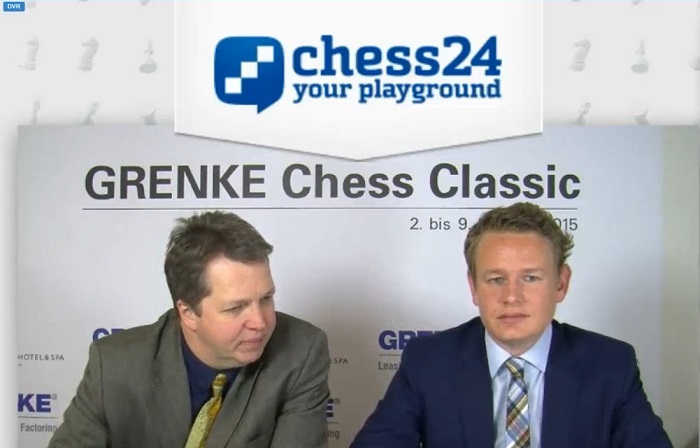
Nigel Short and Jan Gustafsson, 9 February 2015
(image reproduced with the permission of chess24)
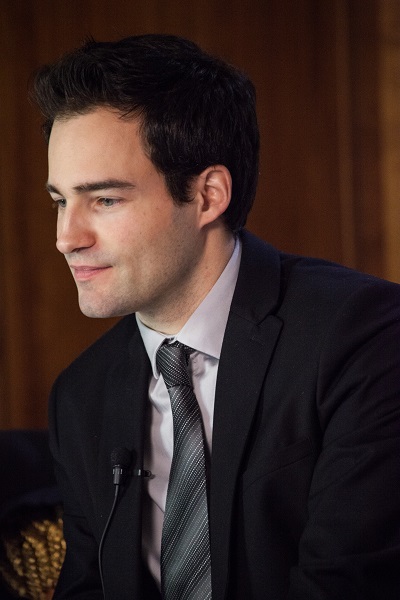
Yannick Pelletier, Zurich, 2014 (photograph reproduced with his permission)

Daniel King (right) with Anish
Giri
(photograph by Maria Emelianova, reproduced with permission)

Yasser Seirawan (photograph reproduced with permission)
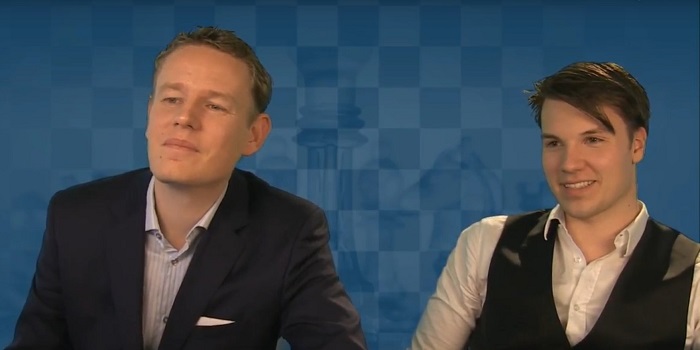
Jan Gustafsson and Robin van Kampen, 26 March
2016
(image reproduced with the permission of chess24)
Jan Gustafsson’s public persona is a seamless blend, somehow congenial and authentic, of false modesty and false egocentricity.
In his column on page 31 of the Observer, 3 September 1972 Clive James remarked that in sports broadcasts Frank Bough ...
‘puts the emphasis on his prepositions and breaks into a shout when you LEAST expect it ...’
Since then, emphasis on prepositions has been increasingly noticeable, and we have even heard a television news presenter welcoming an interviewee down the line with ‘Good afternoon to you’. On Internet chess broadcasts there is now an epidemic. For example:
‘Let’s have a look at that game.’ ‘A nice move by him.’ ‘Things went really well for him.’ ‘He is now in the lead.’
(9117)
Another quirk of certain commentators, and particularly inferior ones, is the excessive use of ‘just’, almost as much as in television cookery programmes (‘White can just play Bc4 and then just castle and just centralize his rook’/‘Just put it in a frying pan and then just fry it off and just serve it up’). There is also a usage which recalls the days when Peter Jones (1920-2000) was the Chairman of the BBC radio programme Twenty Questions. If a panellist enquired whether the mystery object ‘is something like a giraffe’, he would ask, ‘what is like a giraffe?’ Chess broadcasts frequently contain phrases such as ‘If White just plays a move like Qb5 ...’, meaning ‘If White plays Qb5’. We note too (in chess broadcasts and in television news bulletins) the increasing recourse to ‘because’ as a multi-purpose conjunction: ‘This is the scene in the hall because shortly play will be starting.’ (Or, possibly, ‘will be starting’; it is not only prepositions that are emphasized erratically.) On a more positive note, we have yet to witness an Internet broadcaster employing a formulation favoured nowadays by television journalists when introducing filmed interviews: ‘This is what the Prime Minister had to say’ (rather than ‘said’).
During post-mortem interviews, the chess hosts must listen tolerantly to what the players have to say, even if they have to say it with the stream-of-consciousness approach heard in so many sports broadcasts: ‘OK, well, you know, I don’t know, you know, well, maybe he could just have tried to just, OK, maybe, I don’t know, you know.’ Yet at least these unburdenments illustrate the difficulty of chess even for the greatest masters, in contrast to all those atrociously written certainties which some Twitter-users dash off before dashing off to dash off something else.
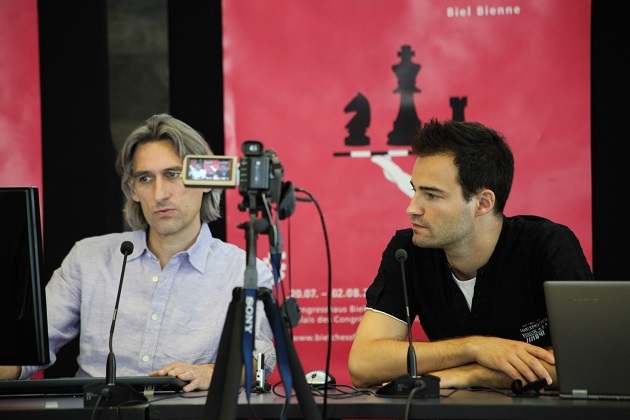
Daniel King and Yannick Pelletier at Biel, 2013 (photograph by Marie Boyard, reproduced with permission)
(9144)
C.N.s 5795, 8099, 8674 and 9436 have drawn attention to valuable material posted by the Streatham & Brixton Chess Blog. Earlier this month, the site ceased publication, but on 21 March 2016 one of its contributors, Justin Horton, began his own webpage, Lost On Time. The first article discusses journalistic standards in Internet broadcasts.
(9810)
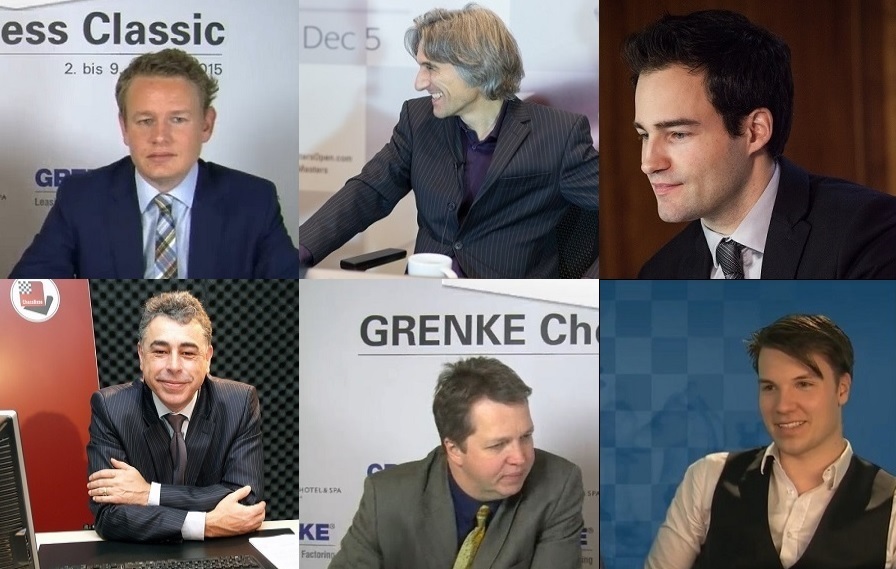
An observation (25 November 2016) in connection with the Carlsen v Karjakin world championship match:
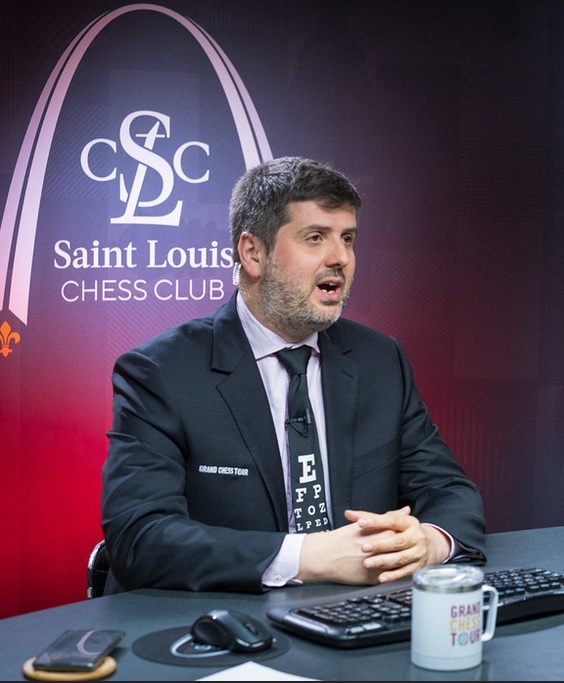
Peter Svidler (photograph courtesy of the Saint Louis Chess Club, Lennart Ootes)
On page 46 of The Moves That Matter (London and New York, 2019) Jonathan Rowson wrote of Daniel King:
‘He is serious in intent, but funny, charismatic and a clear communicator; perhaps the best chess commentator in the world.’
Addition on 27 May 2023:
It is now our view that the best Internet chess host/commentator of them all is Yasser Seirawan.

Jovanka Houska (also an excellent broadcaster) and Yasser Seirawan, The American Cup, Saint Louis, 17 March 2023 (photograph courtesy of the Saint Louis Chess Club, Austin Fuller)
Addition on 29 September 2023:
Since our initial article first appeared, in 2015, the transmission of live chess events has developed greatly. If beginning our comments from scratch now, we would, for example, emphasize the quality of Peter Svidler’s coverage. A name today that will surely be on the list of almost everyone’s favourite chess broadcasters is Daniel Naroditsky, given his combination of acumen and eloquence.
Addition on 1 December 2023:
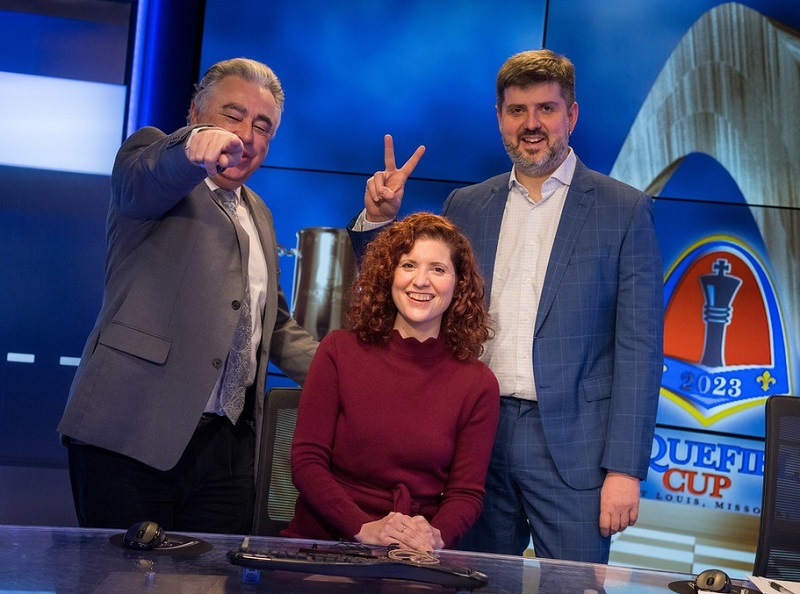
A chess commentary dream team (Yasser Seirawan, Jovanka Houska, Peter Svidler), Saint Louis, 22 November 2023 (photograph courtesy of the Saint Louis Chess Club, Lennart Ootes)
Addition on 10 December 2023 (during the Champions Chess Tour Finals):
Why do some chess commentators imagine that they add excitement by shrieking and flailing?
Our remarks were directed to David Howell as a flailer and to Tania Sachdev as both a flailer and a shrieker.
Addition on 13 July 2023:
One YouTube chess presenter shines through in terms of clarity, freshness and charisma: Zachary (Zach) Saine. See, for example, his coverage of the famous Adams v Torre game.
Addition on 23 September 2023:
Reproduced below with their permission are photographs of Zachary Saine and another exceptional YouTube presenter, Daniel King:

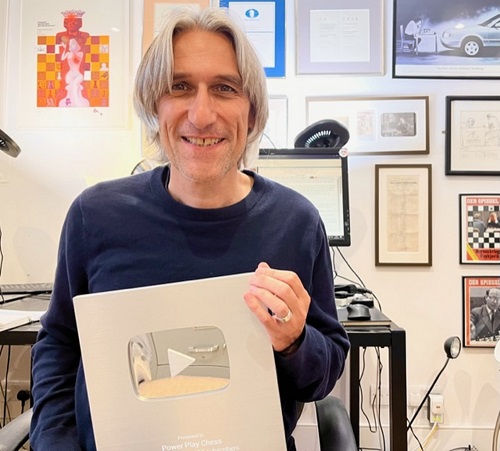
Daniel King’s channel, PowerPlayChess, offers a vast range of games explained with his characteristic expertise and lucidity.
Addition on 17 February 2024:
On YouTube one of the most addictive presenters is Ben Finegold, highly instructive and also the Groucho Marx of chess commentary. Only Finegold could say: ‘They played the Noteboom Variation, named after your favorite player, Variation ...’
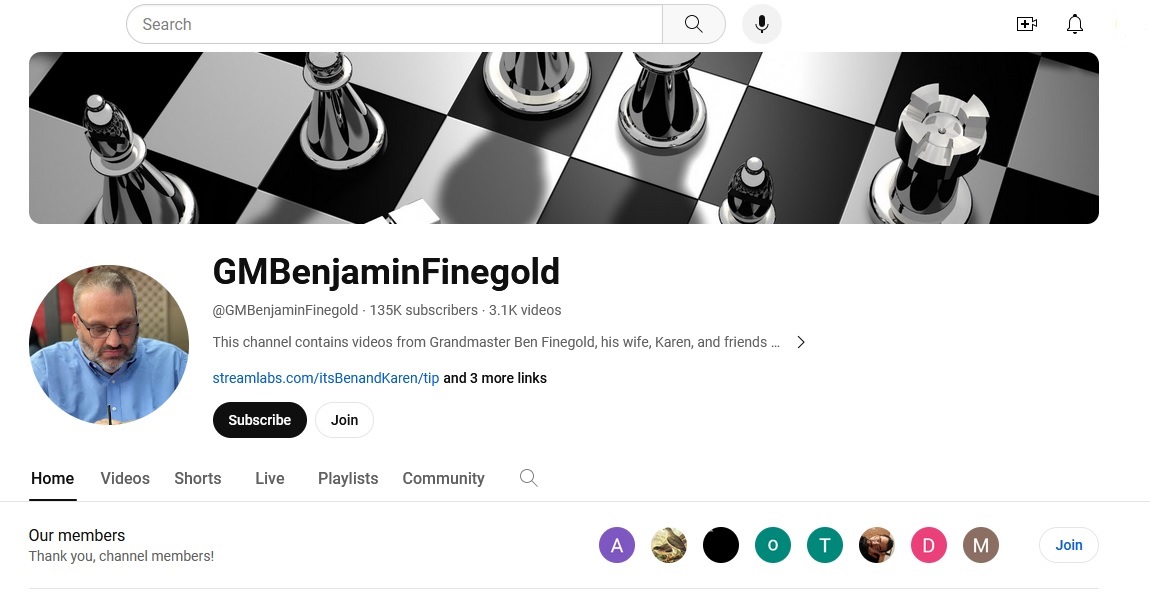
Addition on 19 September 2024:
From C.N. 12024:
Jon Ludvig Hammer is one of the best commentators on YouTube and Twitch, blending lucidity with dry whimsy.
To the Chess Notes main page.
To the Archives for other feature articles.
Copyright: Edward Winter. All rights reserved.